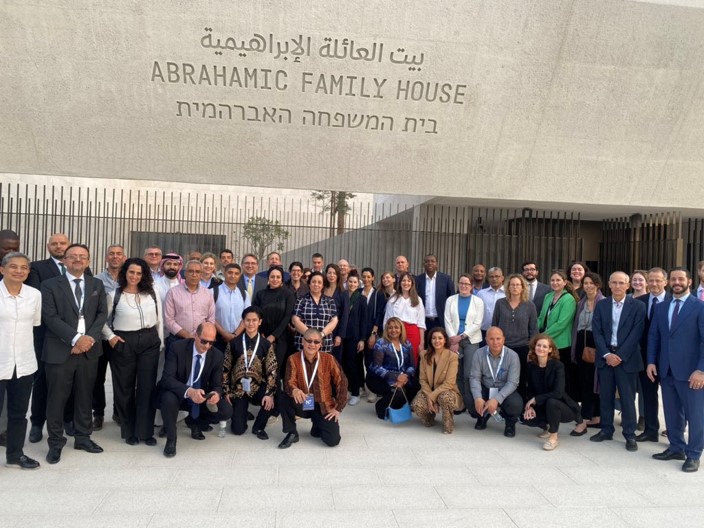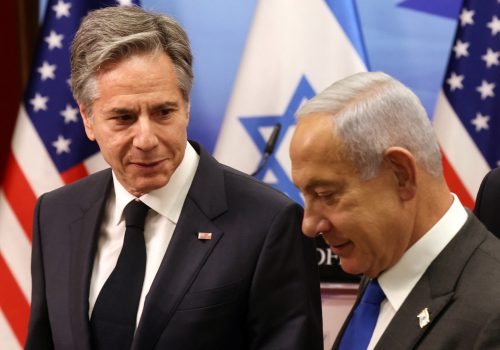
The N7 Conference on Agriculture, Water, and Food Security—which I helped organize—convened in Abu Dhabi on March 14-16 with participants from each of the N7 countries: Bahrain, Egypt, Israel, Jordan, Morocco, Sudan, and the United Arab Emirates (UAE). They were joined by attendees from Tunisia, Indonesia, and Burkina Faso, extending far beyond the Middle East and North Africa region. Plus, for the first time, an N7 Conference included Palestinian participation.
Water scarcity, the challenges of desert agriculture, and food insecurity are problems that are common to all these countries. Even so, this was the first opportunity for all of them to come together to discuss how to tackle these issues.
The depth and diversity of the projects that the participants conceived show how the climate crisis in these societies has given rise to a set of issues around which there is much consensus and a true openness to addressing them together. The ideas that had the most currency among participants were those that represented shared solutions, drawing on each country’s strengths and capabilities, that could be executed across the region. In many cases, the participants demonstrated that powerful solutions are already in the field, but their application in broader regional frameworks will make a material difference.
Take wastewater management. Israel has developed technologies and protocols for the use of treated sewage water for agricultural purposes. It is an important efficiency that ensures multiple uses of significant quantities of water. But applying the technology and Israel’s approach, without modification, would not be effective in every other location. Specific details such as the soil chemistry in which the reused water is deployed, the types of crops it irrigates, and education campaigns taking into account local cultural factors all have bearing on how successful these techniques will be in other countries.
Eliminating food waste is another area that calls for regional approaches. Most N7 countries have some programs—either government- or private-sponsored—to rescue food that would otherwise rot or be discarded. But much more can be achieved if the countries work together with cross-border public-private partnerships, harmonize food safety standards, liberalize and increase efficiency of trade in agricultural commodities, and fast-track crisis management and information sharing protocols—all designed to help N7 countries ensure that food gets to where it is needed.
Applying existing research and expanded training to unique conditions in each country to improve food security also received extensive attention. There is no shortage of expertise in desert agriculture in these countries, but what works in one set of geological and climactic conditions, or with one set of crops, may not succeed when those variables change. With precise experimentation and training, the N7 countries could improve the productivity of cereals and fruit trees by 30 percent in five years and reduce crop losses to pests and diseases by 20 percent in the same period.
All of these projects require the pooling of resources, talent, intellectual capital, and creativity across the boundaries of the N7 countries and beyond, coupled with the ability to influence policymakers by bringing them practical solutions. That work will be especially driven by those former British Prime Minister Tony Blair, in his address to the conference, called the “change-makers,” mostly from the younger generation.
The collaborative atmosphere of the conference was notably warm, as these scientists, entrepreneurs, and policymakers forged personal connections that can translate into longer-term relationships. That included an outing to the Abrahamic Family House, the UAE’s newly opened compound with a mosque, a church, and a synagogue that symbolizes interfaith coexistence.
Even in a period of significant regional tension, governments gave their backing and encouragement to these discussions. Israeli National Security Adviser Tzachi Hanegbi, an attendee at the N7 Conference on Education and Coexistence in Morocco in December, engaged the conference in a virtual discussion. Israeli Ambassador to the UAE Amir Hayek was a constant presence.
Nawal Al Hosany, the UAE’s permanent representative to the International Renewable Energy Agency, and Kristofer Hamel, who leads the Food Security Initiative for the UAE as it plans to host the twenty-eighth United Nations Climate Change Conference of the Parties (COP28) later this year, addressed plenary sessions.
From the United States’ side, US Ambassador to Israel Thomas R. Nides and Principal Deputy Assistant Secretary of State for Near Eastern Affairs Yael Lempert—who leads US efforts to advance the Negev Forum—and multiple congressional supporters of the Abraham Accords from both parties addressed the forum virtually. They included House Foreign Affairs Committee Chairman Michael McCaul, Senator Cory Booker, Senator Joni Ernst, and Representative Brad Schneider.
What this participation tells us is that officials charged with managing relationships in the region see value in the work of such Track 1.5 conferences—that is, including government officials in an unofficial capacity along with non-governmental experts. This conference, hosted by the N7 Initiative (a partnership between the Atlantic Council and the Jeffrey M. Talpins Foundation) with the support of the UAE government, mostly consisted of sessions conducted under the Chatham House rule of non-disclosure to ensure the comfort of participants and promote open exchanges between them. At a time when many official exchanges seem stalled or are moving slowly, these kinds of exchanges can have outsized value in finding areas of shared interest and forging common bonds.
Daniel B. Shapiro is director of the N7 Initiative and distinguished fellow at the Atlantic Council’s Middle East Programs. He is a former US ambassador to Israel.
Further reading
Thu, Feb 2, 2023
What did Blinken accomplish in Israel? More stealth progress on Israeli-Arab normalization.
New Atlanticist By Daniel B. Shapiro
During his visit, the US secretary of state pressed the need and opportunity for expanding and deepening the process of regional integration represented by the Abraham Accords and the Negev Forum.
Mon, Feb 27, 2023
What the opening of the Abrahamic Family House Synagogue in the UAE means for the Jewish community and the rest of the world
MENASource By Marcy Grossman
The Abrahamic Family House, a mosque, church, and synagogue all sharing a multi-faith campus in Abu Dhabi is about to make its worldwide debut, opening its doors to the general public on March 1.
Thu, Dec 15, 2022
Cultural exchange can foster a peaceful coexistence in the Middle East
MENASource By
Cultural exchange is based on the will of individuals, groups, and nations to reach out to each other and better learn, or re-learn, to live together.



